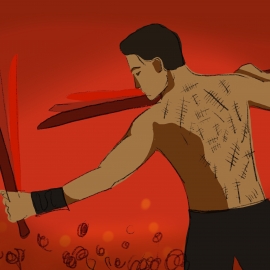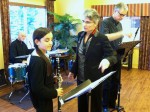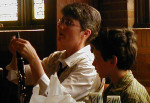Saxophone & Clarinet Lessons 503.888.5796
Mindfulness in Music

The meditation practice I do has three focuses: mindfulness of
As I listened to an episode of The Science of Happiness podcast, I was reminded of how meditation has impacted my clarinet and saxophone playing.
In the episode Find That Inner Calm from Nov. 2018, martial artist and film actor David Wu is invited to choose a happiness practice for one week and report his results in the podcast interview.
Here’s an excerpt from the interview where Daniel talks about what meditating regularly gives him:
DACHER KELTNER Both thinking about the body scan that you did for the show, but also just in general, what’s it give you on a regular basis?
https://greatergood.berkeley.edu/podcasts/item/connect_with_body
DANIEL WU Definitely a sense of inner calm and peace. In fact, I now realize like I thrive in chaotic situations. Like when things are crazy around me, I’m the most calm and the most settled.
It’s about finding the calm in that chaos. When we’re doing martial arts we’re constantly putting our bodies into stress and our minds into stress so that when you go out there and face real stress, you find the calmness in it. Because if you’re in a high anxiety emotional state, that’s really inhibitive. You know, if you let your emotions get over-controlling you then you can’t act correctly
DACHER KELTNER When you’re acting, you’re in this complicated scene and cameras from all angles, can you sense that, ‘Whoa, I’m in a mindful state of acting right now’?
DANIEL WU You don’t want to be in that. You like, you don’t want to be thinking about the acting. It’s just like, I don’t know, Bruce Lee always said, ‘Don’t think, feel.’ You want to get to the point where there’s no inhibitions and you’re not thinking, ‘Oh, there’s 30, 40, 100 people watching me right now perform.’ You know, you just do it, and you be the role and it comes out naturally.
“You be the role and it comes out naturally.” For us musicians I would say, ‘be the music and it comes out naturally’.

DANIEL WU I realized what choreography is, is taking your foundation, which is the letters you know in martial arts—a kick, a spinning kick, a punch or whatever. Those are letters, and you’re stringing them into words. And the choreographer is making those words into poetry, right? And you’re performing that poetry, right? And so if you know the letters, which I know I do because I spent 20 years of my life doing this stuff, then I should be able
https://greatergood.berkeley.edu/podcasts/item/connect_with_bodystring all that stuff together and feel it and feel the poetry. Once that clicked, I didn’t worry about each move anymore. I was thinking about how my body flowed through everything.
And that’s kind of the ultimate level I think of any art. You know, a painter, a writer, or whatever, if you’re not constantly going back and forth in your head about and it just kind of flows out of you that’s kind of the best art that you make.
The letters that Daniel Wu refers to are our notes and scales and technical exercises that we spend hour upon hour practicing. When it comes time to perform, or string it all together in poetry of music, the music flows out of you. You’re not thinking about the ‘particular move’ or chord progression. The music flows out thanks to all that practice.
Practice, Practice, Practice. The results will show up in the flow of your play!
Featured image credit: By Gage Skidmore, CC BY-SA 3.0, https://commons.wikimedia.org/w/index.php?curid=41619488





